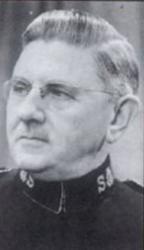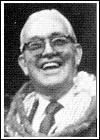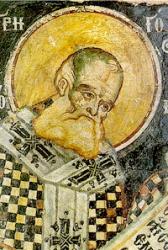Planning worship?
Check out our sister site, ZeteoSearch.org,
for 20+ additional resources related to your search.
- |
User Links
Person Results
John J. Overholt
1918 - 2000 Person Name: Compiler Alterer of "Another Day with All Its Cares" in The Christian Hymnary. Bks. 1-4 John J. Overholt was born to an Amish family of limited means in the state of Ohio in 1918. As a child he was soon introduced to his father's personal collection of gospel songs and hymns, which was to have a marked influence on his later life. With his twin brother Joe, he early was exposed to the Amish-Mennonite tradition hymn-singing and praising worship.
An early career in Christian service led to a two-year period of relief work in the country of Poland following World War II. During that interim he began to gather many European songs and hymns as a personal hobby, not realizing that these selections would become invaluable to The Christian Hymnary which was begun in 1960 and completed twelve years later in 1972, with a compilation of 1000 songs, hymns and chorales. (The largest Menn. hymnal).
A second hymnal was begun simultaneously in the German language entitled Erweckungs Lieder Nr.1 which was brought to completion in 1986. This hymnal has a total of 200 selections with a small addendum of English hymns.
Mr. Overholt married in 1965 to an accomplished soprano Vera Marie Sommers, who was not to be outdone by her husband's creativity and compiled a hymnal of 156 selections entitled Be Glad and Sing, directed to children and youth and first printed in 1986.
During this later career of hymn publishing, Mr. Overholt also found time for Gospel team work throughout Europe. At this writing he is preparing for a 5th consecutive tour which he arranges and guides. The countries visited will be Belgium, Switzerland, France, Germany, Poland, USSR and Romania.
Mr. Overholt was called to the Christian ministry in 1957 and resides at Sarasota, Florida where he is co-minister of a Beachy Amish-Mennonite Church.
Five children were born to this family and all enjoy worship in song.
--Letter from Hannah Joanna Overholt to Mary Louise VanDyke, 10 October 1990, DNAH Archives. Photo enclosed.
John J. Overholt
Rafael Jimenez
Person Name: Rafael Jiménez Author of "¿Qué venías conversando? (El peregrino de Emaús)" in Libro de Liturgia y Cántico
Rafael Jimenez
C. Hubert H. Parry

1848 - 1918 Person Name: C. Hubert H. Parry, 1848-1918 Composer of "RUSTINGTON" in Lutheran Service Book Charles Hubert Hastings Parry KnBch/Brnt BMus United Kingdom 1848-1918. Born at Richmond Hill, Bournemouth, England, son of a wealthy director of the East India Company (also a painter, piano and horn musician, and art collector). His mother died of consumption shortly after his birth. His father remarried when he was three, and his stepmother favored her own children over her stepchildren, so he and two siblings were sometimes left out. He attended a preparatory school in Malvern, then at Twyford in Hampshire. He studied music from 1856-58 and became a pianist and composer. His musical interest was encouraged by the headmaster and by two organists. He gained an enduring love for Bach’s music from S S Wesley and took piano and harmony lessons from Edward Brind, who also took him to the ‘Three Choirs Festival in Hereford in 1861, where Mendelssohn, Mozart, Handel, and Beethoven works were performed. That left a great impression on Hubert. It also sparked the beginning of a lifelong association with the festival. That year, his brother was disgraced at Oxford for drug and alcohol use, and his sister, Lucy, died of consumption as well. Both events saddened Hubert. However, he began study at Eton College and distinguished himself at both sport and music. He also began having heart trouble, that would plague him the rest of his life. Eton was not known for its music program, and although some others had interest in music, there were no teachers there that could help Hubert much. He turned to George Elvey, organist of St George’s Chapel, Windsor Castle, and started studying with him in 1863. Hubert eventually wrote some anthems for the choir of St George’s Chapel, and eventually earned his music degree. While still at Eton, Hubert sat for the Oxford Bachelor of Music exam, the youngest person ever to have done so. His exam exercise, a cantata: “O Lord, Thou hast cast us out” astonished the Heather Professor of Music, Sir Frederick Ouseley, and was triumphantly performed and published in 1867. In 1867 he left Eton and went to Exeter College, Oxford. He did not study music there, his music concerns taking second place, but read law and modern history. However, he did go to Stuttgart, Germany, at the urging of Henry Hugh Pierson, to learn re-orchestration, leaving him much more critical of Mendelssohn’s works. When he left Exeter College, at his father’s behest, he felt obliged to try insurance work, as his father considered music only a pastime (too uncertain as a profession). He became an underwriter at Lloyd’s of London, 1870-77, but he found the work unappealing to his interests and inclinations. In 1872 he married Elizabeth Maude Herbert, and they had two daughters: Dorothea and Gwendolen. His in-laws agreed with his father that a conventional career was best, but it did not suit him. He began studying advanced piano with W S Bennett, but found it insufficient. He then took lessons with Edward Dannreuther, a wise and sympathetic teacher, who taught him of Wagner’s music. At the same time as Hubert’s compositions were coming to public notice (1875), he became a scholar of George Grove and soon an assistant editor for his new “Dictionary of Music and Musicians”. He contributed 123 articles to it. His own first work appeared in 1880. In 1883 he became professor of composition and musical history at the Royal College of Music (of which Grove was the head). In 1895 Parry succeeded Grove as head of the college, remaining in the post the remainder of his life. He also succeeded John Stainer as Heather Professor of Music at the University of Oxford (1900-1908). His academic duties were considerable and likely prevented him from composing as much as he might have. However, he was rated a very fine composer, nontheless, of orchestrations, overtures, symphonies, and other music. He only attempted one opera, deemed unsuccessful. Edward Elgar learned much of his craft from Parry’s articles in Grove’s Dictionary, and from those who studied under Parry at the Royal College, including Ralph Vaughn Williams, Gustav Holst, Frank Bridge, and John Ireland. Parry had the ability when teaching music to ascertain a student’s potential for creativity and direct it positively. In 1902 he was created a Baronet of Highnam Court in Gloucester. Parry was also an avid sailor and owned several yachts, becoming a member of the Royal Yacht Squadron in 1908, the only composer so honored. He was a Darwinian and a humanist. His daughter reiterated his liberal, non-conventional thinking. On medical advice he resigned his Oxford appointment in 1908 and produced some of his best known works. He and his wife were taken up with the ‘Suffrage Movement’ in 1916. He hated to see the WW1 ravage young potential musical talent from England and Germany. In 1918 he contracted Spanish flu during the global pandemic and died at Knightsscroft, Rustington, West Sussex. In 2015 they found 70 unpublished works of Parry’s hidden away in a family archive. It is thought some may never have been performed in public. The documents were sold at auction for a large sum. Other works he wrote include: “Studies of great composers” (1886), “The art of music” (1893), “The evolution of the art of music” (1896), “The music of the 17th century” (1902). His best known work is probably his 1909 study of “Johann Sebastian Bach”.
John Perry
C. Hubert H. Parry
Christopher M. Idle
b. 1938 Person Name: Christopher Idle Paraphraser of "All Baptized Beneath the Cloud" in Singing the New Testament Christopher Martin Idle (b. Bromley, Kent, England, 1938) was educated at Elthan College, St. Peter's College, Oxford, and Clifton Theological College in Bristol, and was ordained in the Church of England. He served churches in Barrow-in-Furness, Cumbria; London; and Oakley, Suffolk; and recently returned to London, where he is involved in various hymnal projects. A prolific author of articles on the Christian's public responsibilities, Idle has also published The Lion Book of Favorite Hymns (1980) and at least one hundred of his own hymns and biblical paraphrases. Some of his texts first appeared in hymnals published by the Jubilate Group, with which he is associated. He was also editor of Anglican Praise (1987). In 1998 Hope Publishing released Light Upon the River, a collection of 279 of his psalm and hymn texts, along with suggested tunes, scripture references, and commentary.
Bert Polman
Christopher M. Idle
Albert W. T. Orsborn

1886 - 1967 Person Name: Albert Orsborn (1886-1967) Author of "Except I am moved with compassion" in The Song Book of the Salvation Army Albert Orsborn, "the poet general", was the sixth leader (general) of The Salvation Army. He led the international organization in the aftermath of World War II (1946-1954), and approved its becoming a founding member of the World Council of Churches (1948). He is noted for his poetry and hymns, of which "My life must be Christ's broken bread" is arguably the best known.
email sent to Hymnary
Albert W. T. Orsborn
Hubert P. Main

1839 - 1925 Arranger of "ELLESDIE" in Baptist Hymnal 2008 Hubert Platt Main DD USA 1839-1925. Born at Ridgefield, CT, he attended singing school as a teenager. In 1854 he went to New York City and worked as an errand boy in a wallpaper house. The next year he became an errand boy in the Bristow & Morse Piano Company. He was an organist, choir leader, and compiled books of music. He also helped his father edit the “Lute Songbook” by Isaac Woodbury. In 1866 he married Olphelia Louise Degraff, and they had two sons: Lucius, and Hubert. In 1867 he filled a position at William B Bradbury’s publishing house. After Bradbury’s death in 1868 the Bigelow & Main Publishers were formed as its successor. He also worked with his father until his father’s death in 1873. Contributors to their efforts were Fanny Crosby, Ira Sankey, Wilbur Crafts, and others. In addition to publishing, Main wrote 1000+ pieces of music, including part song, singing school songs, Sunday school music, hymns, anthems, etc. He also arranged music and collected music books. He 1891 he sold his collection of over 3500 volumes to the Newberry Library in Chicago, IL, where they were known as the Main Library. Some of his major publications include: “Book of Praise for the Sunday school” (1875), “Little pilgrim songs” (1884), “Hymns of Praise” (`1884), “Gems of song for the Sunday school” (1901), “Quartettes for men’s voices: Sacred & social selections” (1913). In 1922 Hope Publishing Company acquired Bigelow & Main. He was an editor, author, compiler, and composer, as well as publisher. He died in Newark, NJ.
John Perry
Hubert P. Main
Wendell P. Loveless

1892 - 1987 Composer of "[There's a long road]" in New Radio Songs and Choruses of the Gospel No. 4 Rv Wendell Phillips Loveless USA 1892-1987, Born in Wheaton, IL, he first engaged in business in Chicago. In 1914 he became a member of an entertainment group that toured the U.S. on the Chatauqua circuit. Spending six years with the group he learned voice, piano, dramatics, and MC duties, later managing the group. He later used these talents in Christian ministry. In 1917 he married Velma Stone, and they had three children: Robert, David, and Wendell Jr. He was a Lieutenant in the Marine Corps during WWI. He was converted through reading the Bible at home. He joined the Moody Bible Institute (MBI) in 1926, first as business manager of the extension department. He later became director of the Moody Bible Institute radio station WMBI in Chicago from 1926-1947. He then became an itinerant Bible teacher. He later pastored the Wheaton Evangelical Free Church, Community Church in Boca Raton, FL, and First Chinese Church of Christ in Honolulu, HI, continuing his radio ministry in the last two locations (also managing station KAIM Honolulu). In 1960 he assigned all his copyrights to Hope Publishing Company. He wrote popular songs and choruses, many found in hymnals published by Hope, and some translated into other languages. He authored several books: “Glimpses of Christ n Psalm IX” (1937); “Sunrise meditations” (1940); “New radio songs & choruses of the gospel #3” (1940); New radio songs & choruses of the gospel #4” (1942); “Little talks on great words” (1942?); “Christ and the believer in the Song of Songs” (1945); “Plain talks on practical truths” (1945); “New sunrise meditations” (1945); “Manual of gospel broadcasting” (1946); “Plain talks on Romans” (1946); “New radio songs & choruses of the gospel #5” (1946). He died in Honolulu, HI. He was an author, compiler, performer, editor, narrator, composer, actor, and writer.
John Perry
Wendell P. Loveless
Noel Rawsthorne
b. 1929 Person Name: Noel Rawsthorne, b. 1929 Arranger of "[We have a King who rides a donkey]" in Complete Anglican Hymns Old and New
Noel Rawsthorne
St. Gregory of Nazianzus

329 - 389 Person Name: Gregory Nazianzen Author of "O soul of mine, repining" in Songs and Hymns of the Earliest Greek Christian Poets Gregory of Nazianzus (St. Gregory Nazianzen), Bishop of Sasima and of Constantinople, son of Gregory, Bishop of Nazianzus in Cappadocia, and Nonna, his wife, was born at a village near that city where his father had an estate, and called Arizanzus. The date of his birth is unknown, but is generally given as A.D. 325. In early childhood he was taught to read the Scriptures by his mother. From his home he passed with his brother Caesarius to a school at Caesarea, the capital of Cappadocia, where he was instructed by one Carterius, supposed by some to be the same as the subsequent head of the monasteries of Antioch, and instructor of St. Chrysostom. At Caesarea he probably met with Basil, with whom he maintained a life-long friendship. From Caesarea Basil went to Constantinople, and Gregory and his brother to Caesarea in Palestine. In a short time his brother passed on to Alexandria, whilst he remained behind to study rhetoric, and then followed his brother to that city. From Alexandria he went to pursue his study at Athens. On his journey there the ship in which he sailed encountered a severe hurricane, so much so, that all despaired of life. The voyage, however, terminated safely, and Gregory felt his deliverance to be a fresh call upon him to devote himself to God. At Athens, Julian (the Emperor) was a fellow student, and there he also met Basil again, and rendered him much assistance. His studies at Athens extended over some ten years. About 356 he returned to Nazianzus, from whence, after great persuasion on the part of Basil he joined the latter at Pontus, and devoted himself for some two or three years to an ascetic life. On returning to his home the holy office of the priesthood was forced upon him by his father: but instead of exercising his office he fled to Pontus, only to return again in a few months.
Ordained, probably at Christmas, he preached his first sermon in the Church at Nazianzus on the following Easter-day, A.D. 362. In 370, through Basil, who had become Metropolitan of Cappadocia and Exarch of Pontus, Gregory consented most unwillingly to be consecrated as Bishop of Sasima. Subsequently he became for a short time his father's coadjutor at Nazianzus. About Easter, A.D. 379, he was called by the oppressed orthodox Christians of Constantinople to that city. The people's wish was supported by the voice of many of the bishops. He arrived there, it is supposed, about Easter. He found the adherents of the Nicene Creed few, and crushed by the heretics, and without a church in which to worship. His work, and the opposition he met with in that city, we cannot detail here. Failing health, and a dispute respecting the validity of his position as Bishop of Constantinople, led him, in A.D. 381, to retire to Nazianzus. After administering the affairs of that diocese for a short time he retired to his birthplace at Arizanzus, and occupied his remaining years--probably about six-—in writing poems, &c. He died cir. 390.
St. Gregory's extant writings were published in two folio volumes, the first in 1778; and the second in 1840. This is commonly known as the Benedictine edition and is entitled Sancti Patris nostri Gregorii Theologi vulgo Nazianzeni Archiepiscopi Constantinopolitani, Opera omnia quae extant vel ejus nomine circumferuntur, ad MSS. codices Gallkanos, Vaticanos, Germanicos, Anglicos, nee non ad antiquiores editiones castigata, &c, &c. Vol. i. contains 45 Sermons, and vol. ii. Letters on Various Subjects, and his poems. The latter are in two Books: Book. i. (1) dogmatic, (2) moral; Book. ii. historical, (1) relating to himself, (2) relating to others, including epitaphs, &c. The dogmatic poems are 38; the moral 40; those relating to his own life 99, and miscellaneous over 60. Many of these are given in the Anthologia Graeca Carminum Christianorum, and Daniel, iii. pp. 5, 16, and 8 are trans¬lated by Mr. Chatfield in his Songs and Hymns of the Greek Christian Poets, 1876. For fuller details of St. Gregory's Life and Writings, his works in ms. and book form and other matters relating thereto, see Dictionary of Christian Biographies., vol. i. pp. 741-761, and for criticism of his poetry, Greek Hymnody, § iv.
-- John Julian, Dictionary of Hymnology (1907)
St. Gregory of Nazianzus


 My Starred Hymns
My Starred Hymns


